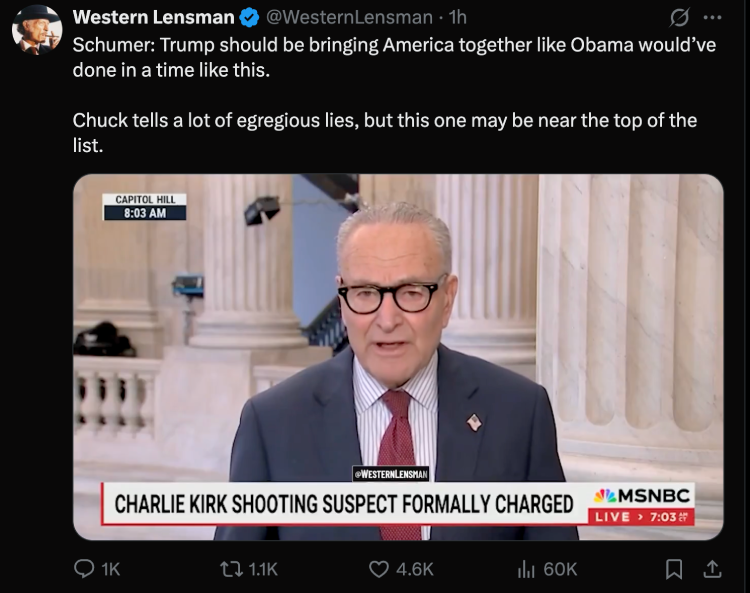
Schumer: Trump should be bringing America together like Obama would’ve done in a time like this.
Chuck tells a lot of egregious lies, but this one may be near the top of the list. pic.twitter.com/fRtaKn21Pq
— Western Lensman (@WesternLensman) September 17, 2025
An Investigative Analysis of Chuck Schumer’s Claims About Presidential Unity
Senator Chuck Schumer’s recent assertion that President Trump should emulate Barack Obama’s unifying approach during times of crisis deserves scrutiny against the historical record. While Obama campaigned on themes of unity and hope, a careful examination reveals numerous instances where his administration’s actions and rhetoric arguably deepened rather than bridged America’s divides.
The Pattern: Unity Rhetoric vs. Divisive Practice
Race Relations: Inflammatory Interventions
Obama’s handling of high-profile racial incidents often inflamed rather than cooled tensions. The 2009 Henry Louis Gates arrest prompted Obama to admit that police “acted stupidly” without knowing the facts. More significantly, his administration’s response to the Trayvon Martin case in 2012 marked a turning point.
Rather than calling for calm deliberation, Obama personalized the case: “If I had a son, he would look like Trayvon.” This statement, while emotionally resonant, injected presidential authority into an ongoing legal proceeding and arguably prejudiced public opinion before facts emerged. The pattern continued with Michael Brown in Ferguson, where Obama sent administration officials to Brown’s funeral while the case remained under investigation.
The “Bitter Clingers” Revelation
Perhaps no single comment better encapsulated Obama’s divisive tendencies than his 2008 remarks at a San Francisco fundraiser: “They get bitter, they cling to guns or religion or antipathy toward people who aren’t like them.” This characterization of working-class Americans revealed a fundamental contempt that would define his relationship with rural and conservative voters throughout his presidency.
Weaponizing Federal Agencies
The IRS targeting scandal demonstrated how Obama’s administration used federal power against political opponents. Conservative groups seeking tax-exempt status faced unprecedented scrutiny, delays, and invasive questioning about their donor lists and political activities. While Obama claimed ignorance, emails revealed coordination between the IRS, Treasury, and White House officials.
The Justice Department’s surveillance of Associated Press reporters and Fox News journalist James Rosen represented an assault on press freedom that preceded and arguably enabled later attacks on media independence.
Healthcare: Ramming Through Division
The Affordable Care Act’s passage exemplified Obama’s approach to “unity.” Despite controlling both chambers of Congress, Obama made no meaningful attempts at bipartisan compromise. When Massachusetts voters elected Republican Scott Brown specifically to block the healthcare bill, Obama and Democratic leadership used procedural maneuvers to circumvent this democratic expression.
“We won,” Obama told Republican leaders early in his presidency, dismissing their policy concerns. This approach to governance prioritized ideological victory over the collaborative leadership Schumer now claims as Obama’s legacy.
Economic Recovery: Selective Bailouts
Obama’s response to the 2008 financial crisis, while stabilizing markets, created lasting resentment through selective intervention. Wall Street received trillion-dollar bailouts while ordinary Americans faced foreclosure. His administration’s failure to prosecute banking executives while simultaneously lecturing Americans about “skin in the game” highlighted a two-tiered justice system.
The auto bailout, while economically defensible, violated established bankruptcy law and prioritized union interests over bondholders’ legal rights, undermining the rule of law principles.
Foreign Policy: Creating New Enemies
Obama’s “leading from behind” approach in Libya resulted in state collapse and the Benghazi attack. His “red line” threat against Syria, followed by inaction when chemical weapons were used, emboldened adversaries and confused allies.
The Iran nuclear deal’s secretive negotiations and cash payments to the world’s leading state sponsor of terrorism alienated regional allies and congressional representatives of both parties.
Cultural and Religious Divides
Obama consistently positioned himself against traditional American values. The Justice Department’s bathroom mandate for transgender students forced local communities into unwanted federal oversight. His administration’s contraception mandate forced religious organizations to violate their conscience or face crushing penalties.
When Christians faced genocide in the Middle East, Obama’s refugee policies prioritized Muslims over persecuted religious minorities, a policy so discriminatory that it violated America’s historical commitment to protecting the persecuted.
The Media’s Protective Coverage
Much of Obama’s divisive behavior escaped serious scrutiny due to sympathetic media coverage. His administration’s image management, led by figures like Ben Rhodes, who boasted about creating an “echo chamber” of supportive journalists, obscured the reality of his governing style.
The contrast with coverage of subsequent presidents reveals how media protection enabled Obama’s divisive actions while his unity rhetoric remained unchallenged.
Conclusion: The Schumer Standard
Senator Schumer’s invocation of Obama as a model of presidential unity reveals either historical amnesia or partisan calculation. Obama’s presidency, whatever its other merits, was marked by consistent efforts to delegitimize opposition, weaponize federal agencies, and impose narrow ideological victories over broader democratic consensus.
The Obama presidency offers many lessons for contemporary politics, but unity and bringing Americans together are not among them. Any honest assessment must acknowledge that Obama’s legacy includes deepened racial tensions, weaponized institutions, and a more polarized political landscape than he inherited.
Political leaders invoking Obama’s example should specify which aspects they wish to emulate. If it’s the soaring rhetoric of unity, they should also acknowledge the divisive reality that too often followed. American democracy deserves leaders who match their unifying words with unifying actions—something Barack Obama, despite his considerable political gifts, consistently failed to deliver.
